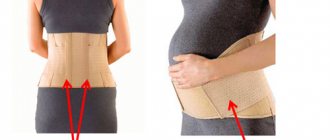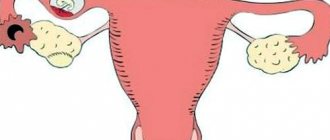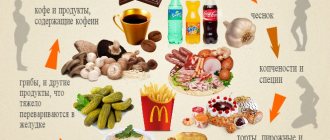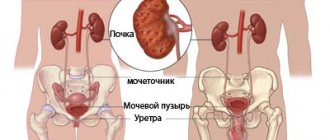Usually the 16th week for expectant mothers is quiet and calm. The girls are feeling good. All hormonal storms calmed down, the body rebuilt itself and got used to the new conditions. Appetite improves, toxicosis gradually subsides, you feel a surge of new strength. Also, the skin looks better and the hair becomes shiny and healthy. The mammary glands become enlarged.
During this period, there is a noticeable growth of the uterus, which, having filled the pelvic area, gradually extends beyond its limits. As a result, the uterus puts pressure on the intestines. Therefore, sometimes you may experience constipation, heartburn, bloating and indigestion.
The 16th week of pregnancy is the calmest
Symptoms that should not be ignored
Specialized help may be needed if:
- You experience severe pain that does not subside;
- You experience cramps of varying intensity;
- Your gastrointestinal tract is disrupted, severe nausea, vomiting and a sharp decrease in appetite appear;
- You notice bloody discharge from the genital tract;
- When palpated, the pain begins to get worse.
All these signs indicate that additional diagnostics are urgently needed to eliminate the cause of the disruption in the normal course of pregnancy.
Additional diagnostic methods:
- ultrasound of the pelvic organs;
- colposcopy (cervical examination);
- According to indications, an examination of the uterine cavity (hysteroscopy) may be prescribed.
- To avoid sexual transmission, gynecological smears are recommended.
- general analysis of urine and blood;
- bacteriological culture of urine helps to exclude pathologies of the urinary tract;
- to detect intra-abdominal bleeding through the posterior vaginal fornix, a puncture of the abdominal cavity can be performed;
- consultations with doctors of other specialties.
Timely examination prevents serious consequences
Leading specialists in the management of complex pregnancies in the Southern Federal District
Ermolaeva Elvira Kadirovna is a well-known and recognized specialist in the North Caucasus in the field of diagnosis and treatment of miscarriage, miscarriage, recurrent miscarriage, management of pregnant women with thrombophilia, antiphospholipid syndrome (APS), systemic lupus erythematosus (SLE), uterine fibroids, management of pregnancy in young and older pregnant women (after 38 years), management of capricious pregnant women, management of pregnant women with excess body weight. A good obstetrician-gynecologist, a specialist in rational nutrition during pregnancy, a physiotherapist-resortologist, an experienced ultrasound doctor. Those who want to maintain their figure and successfully carry woman's pregnancy.
Ermolaev Oleg Yurievich Candidate of Medical Sciences, gynecologist-endocrinologist with 25 years of experience and successful experience in managing pregnancy in women with uterine prolapse, bicornuate uterus, saddle uterus and other malformations of the genital organs, managing pregnant women with livedo, thrombophilia and antiphospholipid syndrome (APS) , polycystic ovary syndrome. Management of multiple pregnancies, which require special attention and experience from doctors. Management of pregnancy after IVF, ICSI, after artificial insemination. Management of pregnant women with placental insufficiency. Management of pregnancy against the background of an IUD.
About the doctors of the Clinic in detail...
INTERNATIONAL RECOGNITION of the reputation and achievements of the Women's Health Resort Clinic in the development and implementation of effective and safe treatment methods and the quality of medical services provided is the AWARDING of the Women's Health Resort Clinic in Pyatigorsk with the SIQS International QUALITY CERTIFICATE in the field of medicine and healthcare. International Socratic Committee, Oxford, UK and Swiss Institute for Quality Standards, Zurich, SWITZERLAND. Read more…
Processes in the body that cause nagging pain at 16 weeks of pregnancy
The second trimester of pregnancy is considered the calmest, but not for everyone. Some people often experience pain in the lower abdomen and sides. If the pain is nagging and weak, this indicates that the uterus is growing and the muscles around it are stretching. The pain may intensify due to physical overexertion. Therefore, follow the work schedule and rest on time.
Another cause of abdominal pain at 16 weeks of pregnancy is poor nutrition. Watch how you eat, exclude spicy, salty and fatty foods. They cause constipation and bloating.
If you have a tightness in your lower abdomen, it can sometimes be a sign of uterine hypertonicity. But only an observing doctor can independently find out all the reasons for this condition. If this happens to you, immediately go to the doctor to eliminate all possible risks of bad developments.
Almost every pregnant girl experiences constipation and flatulence. One of the reasons is gestational hormones, which slow down the motility of the gastrointestinal tract. In simple terms, food moves through the digestive tract much more slowly than usual.
Important! To relieve constipation, eat more fiber-rich foods and drink more water. If this is not enough, the attending physician will prescribe organic preparations. They will help soften the stool, but will not cause any harm to your baby or the body.
Water is the best way to combat constipation.
Sometimes you may be bothered by intense stabbing pain in the round ligament, as well as nagging abdominal pain at 16 weeks of pregnancy. This happens due to the growth of the uterus, which in turn stretches the round ligaments. Usually this pain goes away on its own.
But if any pain is unbearably strong and does not go away for a long time, you should immediately contact your supervising doctor.
What's happening
At the 16th week of pregnancy, the length of the fetus will reach 11 - 11.5 cm, and the weight will be 80 g. All vital processes are actively going on in the body of the little man: the heart is working hard, the kidneys are regularly excreting urine, the development of the central nervous system continues. By 15–16 weeks of pregnancy, the composition of the fetal blood has already taken shape: it, as it should be, consists of lymphocytes, erythrocytes and monocytes. It contains fetal (or “fetal”) hemoglobin: it is needed for a better supply of oxygen to cells, and in a newborn its share is about 80 - 85% of the total amount. However, already at this stage, “adult” hemoglobin appears - within six months after the birth of the child, it will replace the fetal one.
By the 16th week of pregnancy, the baby’s muscles have already become sufficiently strong, he has learned to hold his head straight and turn it from side to side, and move his fingers and toes. Your baby is very active: he smiles, frowns, yawns, swallows, spits, sucks his thumb and even tries to play with what he finds nearby: he grabs the umbilical cord, touches his arms and legs. And if there is more than one baby in the mother’s belly, the children communicate with each other.
Alarming symptoms
You need immediate professional help if you have one of the following symptoms:
- Increasing and acute pain that does not calm down even after lying down;
- YOU are having contractions of varying intensity;
- You have no appetite, toxicity, disturbances in the digestive tract;
- The presence of any bloody discharge;
- When you press on the lesion, the pain intensifies.
These symptoms are not physiological norms. They signal pathological processes
What to do if the membranes rupture?
RUPTURE of the amniotic sac always occurs unexpectedly and WITHOUT PAIN.
If amniotic fluid leaks or is suspected of leaking, you should NOTE THE TIME of the incident (“note the time”), PLACE a clean SHEET between your legs, take a horizontal position (LIE) and CALL your doctor.
If it is impossible to discuss the situation with your doctor, you should immediately CALL an ambulance.
This algorithm of actions in case of rupture of membranes is the only correct one, since after 12 hours the probability (risk) of infection of the fetus and the pregnant woman increases significantly, and the need arises to resolve the issue of the method of delivery (birth).
Considering that RUPTURE of the amniotic sac always occurs UNEXPECTEDLY, a pregnant woman must constantly CARRY with her an outpatient (exchange) card, a copy of her passport, and an insurance policy. YOU CAN have electronic COPIES of your exchange card, passport, insurance policy in your PHONE.
CHECK that your doctor's telephone number, obstetric hospital telephone number and emergency medical service telephone number are available in your phone book (in your phone).
If a critical situation arises, DO NOT rely only on yourself - LOUDLY, thinking about the child and WITHOUT HESITATION, seek help from others, warning about your pregnancy.
Starting from 24 weeks of pregnancy, it is very wise to form an “ALARM SUITCASE”. A complete list of things for the maternity hospital in detail...
The threat of miscarriage, the threat of premature birth, rupture of amniotic fluid are contraindications to driving: call an ambulance, DO NOT RISK the health of the baby, your life and the well-being of your family!
When you need to see a doctor urgently
For any sudden and disturbing sensations, it is better to consult a gynecologist.
If you have a cold, it is best not to self-medicate, and especially not to let the disease take its course. Such a problem as a frozen pregnancy is not noticeable the first time. Visit your doctor regularly to listen to your heartbeat and monitor your baby's growth. The main signs of a frozen pregnancy are nagging pain in the lower abdomen and bleeding. Additional symptoms are a sudden change in breast size, its return to its previous state, as well as a sudden cessation of toxicosis. If the frozen pregnancy is prolonged, the woman experiences weakness, loss of appetite, fever, and intoxication. In this case, consult a doctor immediately.
Medical observation
At the 16th week of pregnancy, in addition to a general blood and urine test, you may have to donate blood for a coagulogram (to determine its coagulation), free estriol, AFP and hCG. With diseases such as Down syndrome, cranial hernia and anencephaly, the level of these substances will deviate from the norm.
Usually an ultrasound is not performed at 16 weeks of pregnancy, but if one is prescribed, the expectant mother will be able to observe on the monitor not only the movements of her baby, but also his facial expressions. This time, using a regular ultrasound machine, you can determine the sex of the child, if, of course, your baby turns the right way.
In some cases, amniocentesis is prescribed at the 16th week of pregnancy. For this test, a puncture is made in the amniotic sac and a small amount of amniotic fluid is removed using a needle. A diagnostic test allows you to determine with almost absolute certainty whether the fetus has a particular pathology. This study can identify several hundred genetic defects. But this procedure is unsafe: according to statistics, infection occurs in one case out of a thousand, and the risk of miscarriage as a result of amniocentesis is approximately 0.5 - 1%. Therefore, unless absolutely necessary, it is better not to puncture the amniotic membrane at the 15th - 16th week of pregnancy.
Treatment methods for nagging pain
If the unpleasant sensations are caused by physiological factors, then the gynecologist will recommend getting more rest, walking in the fresh air, and eating properly and nutritiously. But in case of pathological processes, appropriate treatment will be prescribed:
- If uterine hypertonicity is diagnosed, then antispasmodic drugs are prescribed;
- For an ectopic pregnancy, surgery is necessary. Afterwards, hormonal therapy is prescribed;
- If the pain is inflammatory and infectious in nature, then medications are prescribed that do not affect the natural intrauterine development of the fetus.
Why is it necessary to lie down when there is a threat of miscarriage or a threat of premature birth?
The uterus is a muscular organ consisting of multidirectional muscle fibers that make up a single muscle.
Thus, the cervix and the body of the uterus are a single muscle. A protective increase in tone (PROTECTIVE SPAS) of the cervix protects the uterus from opening and at the same time, due to the painful sensation, ALLOWS a woman to RECOGNIZE the wrongness of the actions she has committed (or is performing).
The HORIZONTAL POSITION can significantly reduce the load on the cervix and, in most cases, contributes to the natural normalization of uterine tone.
Taking medications aimed at reducing the tone of the uterus has a similar effect.
However, when moving to a vertical position, the cervix, relaxed by the drug, cannot fully perform the retaining function!
THE RISK OF MISCARRIOR (premature birth) when the body is in an upright position while taking medications that relax the uterus increases sharply.
JUST LIE! And strictly follow your doctor’s recommendations!
A protective INCREASE in the TONE of the uterus is a natural PROTECTIVE REACTION aimed at preserving the offspring. You need to LIE!











